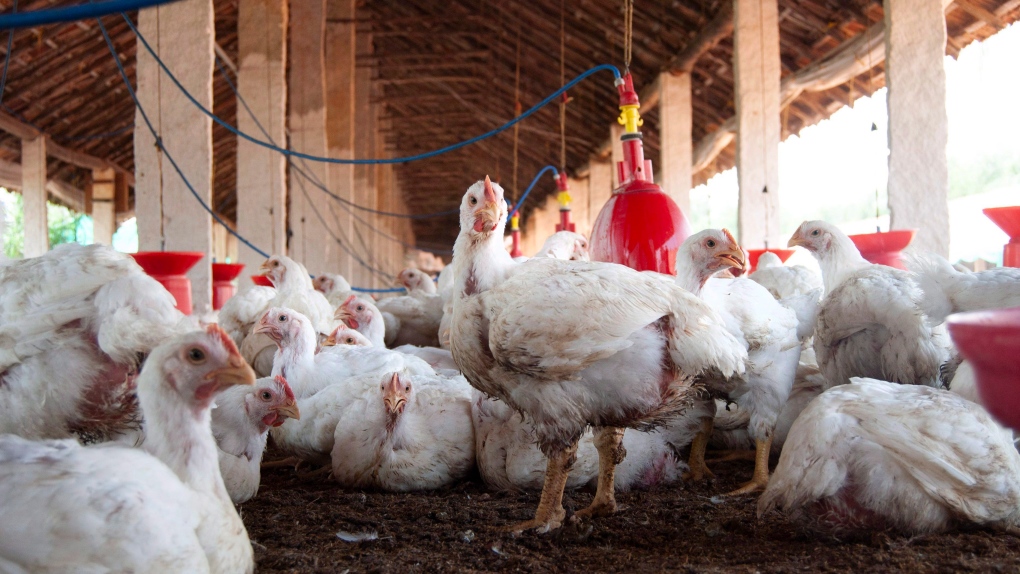Bird flu on the rise in Manitoba
 Poultry can be seen in this photograph by The Canadian Press (THE CANADIAN PRESS/Aleksandra Sagan)
Poultry can be seen in this photograph by The Canadian Press (THE CANADIAN PRESS/Aleksandra Sagan)
Avian influenza, also known as bird flu, is on the rise in Manitoba.
According to the Government of Canada’s website, this contagious viral disease that affects domestic and wild bird species has been reported at three commercial poultry operations in Manitoba in September. These cases were detected in the RM of Cartier and the RM of Bifrost-Riverton.
FortWhyte Alive tells CTV News Winnipeg that the spread of avian influenza is tied to migration season with birds heading south and gathering in larger groups.
“Avian flu has been a concern for Manitoba and the world, and particularly last spring, it popped into the news as it was coming up with migratory birds from the south,” explained Katrina Froese, education program coordinator at FortWhyte Alive, in an interview on Tuesday.
“People who work in agriculture, with chicken farms, or people who have small flocks are particularly concerned. And then also people who backyard bird feeders were on alert.”
Froese added the issue among wild birds is that avian influenza can lead to death and disease.
She said a major concern is also for farmers who handle a large number of birds inside barns, “where if a virus were to get in there it would spread quickly among their flock.”
For those with backyard chickens, Froese recommends minimizing contact with wild birds and chickens.
Anyone with bird feeders at their home should clean them and rake any spilled food on the ground.
“What is recommended is at least every week, take your feeder down, get rid of any of the food in there. Wash your feeder, let it soak for half an hour in 10 per cent bleach solution,” Froese said.
The Manitoba government’s website says that on rare occasions, avian influenza can cause disease in humans, and that human to human transmission is “extremely rare.”
Froese said that as long as eggs and meat are properly cooked, there is not much concern for humans.
She added that people should not hand-feed any geese, ducks or birds they may come across.
Anyone who sees anything of concern in regards to avian influenza can call 1-800-782-0076. Symptoms in birds include coughing, wheezing, weakness, swelling in the throat and diarrhea, as well as sudden death.
CTVNews.ca Top Stories

Canadian team told Trump's tariffs unavoidable right now, but solutions on the table in surprise Mar-a-Lago meeting
During a surprise dinner at Mar-a-Lago, representatives of the federal government were told U.S. tariffs from the incoming Donald Trump administration cannot be avoided in the immediate term, two government sources tell CTV News.
Pedestrian killed by Via Rail train near Kingston, Ont.
Regular rail traffic has resumed with severe delays.
Muskoka reacts to major snowfall, hundreds stuck on Highway 11
From road closures, power outages, weather declarations and nonstop shovelling, Muskoka residents were faced with nearly a metre of persistent snowfall on Saturday.
Saskatoon priest accused of sexual assault says he meant to encourage young girl with hug and kiss
A Saskatoon priest accused of sexual assault says he meant to encourage and reassure a young girl when he hugged and kissed during his testimony at Saskatoon Provincial Court Friday.
Beef prices reach record highs in Canada
The cost of beef continues to rise, reaching record highs on grocery store shelves ahead of the busiest time for many grocers and butchers before the holiday season.
Trump threatens 100% tariff on the BRIC bloc of nations if they act to undermine U.S. dollar
U.S. president-elect Donald Trump on Saturday threatened 100 per cent tariffs against a bloc of nine nations if they act to undermine the U.S. dollar.
Bob Bryar, drummer for rock band My Chemical Romance, dead at 44
Bob Bryar, former drummer for the band My Chemical Romance, has died. He was reportedly 44.
Toronto man accused of posing as surgeon, giving four women injections
A 29-year-old Toronto man has been charged after allegedly posing as a surgeon and providing cosmetic procedures on several women.
'Disappointing': Toronto speed camera cut down less than 24 hours after being reinstalled
A Toronto speed camera notorious for issuing tens of thousands of tickets to drivers has been cut down again less than 24 hours after it was reinstalled.


































